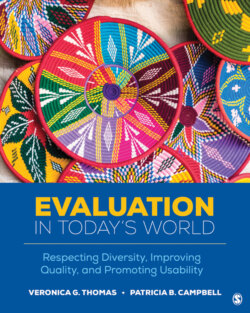Читать книгу Evaluation in Today’s World - Veronica G. Thomas - Страница 63
На сайте Литреса книга снята с продажи.
Ethics in Evaluation
ОглавлениеVirtually every scientific field or discipline has guidelines that are codified in a set of statements put forth by its relevant professional association. Organizations such as the American Evaluation Association (AEA), National Society of Professional Engineers (NSPE), American Psychological Association (APA), American Sociological Association (ASA), National Association of Social Workers (NASW), and American Nurses Association (ANA) have a publicly disclosed, aspirational set of ethical guidelines for professionals. While the guidelines may differ in content and detail across various organizations, all represent an aspirational set of principles, values, and beliefs that help define the organization and address four overarching issues: (a) respect others’ rights to act freely and make their own choices while protecting the rights of those who may be unable to fully protect themselves; (b) do no harm including both physical injury and psychological harm such as damage to an individual’s reputation, self-esteem, or emotional well-being; (c) act fairly by treating individuals equitably and without regard to race, gender, socioeconomic status, or other characteristics; and (d) help or benefit others through promoting the common good and interests of individuals and society.
In contrast to an organization’s code of conduct, which is a directional document focusing on compliance and rules that describe how its members should behave in specific situations (e.g., forbid sexual harassment or racial intimidation), ethical guidelines include broad aspirational values and principles intended to provide an organization’s members with a general idea of the types of decisions and behaviors (e.g., treat others with respect) that are acceptable and encouraged by the profession. Individuals must interpret the organization’s ethical principles and adapt them in practice. A discipline’s ethical statements are used to guide practitioners of that discipline in determining the right course of action in a situation. On the one hand, evaluation shares ethical challenges similar to those of other types of social and behavioral science research. For example, public scrutiny of evaluation, like that occurring in other types of research, has resulted in heightened attention to examining whose views are included or excluded, determining design choices, considering how findings are checked for accuracy, and focusing on how results are reported (Wolf, Turner, & Toms, 2009). On the other hand, evaluation can be challenged by a variety of ethical issues beyond those confronted in other social and behavioral science research. In a presentation on ethical land mines in program evaluation delivered at the 1997 American Educational Research Association (AERA) Annual Meeting in Chicago, Linda Mabry stated that
evaluation is the most ethically challenging of the approaches to research inquiry because it is the most likely to involve hidden agendas, vendettas, and serious professional and personal consequences to individuals. Because of this feature, evaluators need to exercise extraordinary circumspection before engaging in an evaluation study. (quoted in McDavid, Huse, & Hawthorn, 2013, p. 468)
In 1999, Mabry added that of all the methods of social science inquiry, evaluation occurs in the most intensely political milieu where the heaviest assaults to ethics are threatened. Evaluation, she contended, involves risks that are rare in research such as generating final reports that can lead to expansion of a program or to its reconfiguration, shrinkage, or termination. Furthermore, evaluators are “often flattered, coddled, granted selective access, indoctrinated, misinformed, disregarded, challenged, or discredited according to the interests and opportunities of clients, program personnel, or other stakeholders” (Mabry, 1999, p. 200). Barnett and Camfield (2016) point out that the wholesale adoption of research ethics may not provide the most appropriate solution for evaluation. Instead, they propose a different approach to evaluation ethics that addresses stakeholder relationships, helps rebalance the primary focus on the respondent, and focuses on the duties and responsibilities of evaluation to society more broadly.
Research ethics has a predominant focus on the researcher–research participant relationship. In evaluation, however, other equally important relationships must be considered from an ethical perspective. These include relationships with a host of other stakeholders such as program administrators, service providers, program participants, and community members. Evaluators may experience role conflict with certain stakeholders, such as program staff, funders, or program clients, that raises ethical dilemmas. Happy clients (e.g., program administrators) make for pleasant working conditions for the evaluator, and these stakeholders’ favorable comments can generate additional contracts for the evaluator that ultimately enhance both income and professional standing (Mabry, 1999). Thus, client or stakeholder appeasement creates positive bias, which raises not only a validity issue but also an ethics issue. Evaluators who choose to comfort or enrich themselves by providing reports that cheer more than inform may hinder clients’ access to the information promised, foreclose on opportunities for program improvement, warp managerial decisions, and yield preventable negative human consequences (Mabry, 1999). The following case study provides an example of a key stakeholder (i.e., the director) attempting to cajole an evaluator in a manner that could present an ethical dilemma depending on the evaluator’s action.
